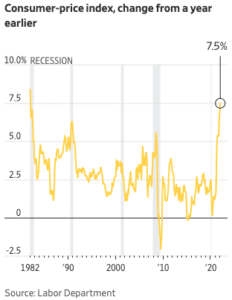If you’ve felt a substantial pinch in your wallet over the past few months, you’re not imagining things.
Inflation surged to 7.5% in January, the highest year-over-year increase in the price of goods and services in 40 years, the U.S. Bureau of Labor Statistics (BLS) reported on Thursday.
The BLS noted that the cost of food, electricity, and shelter were the largest contributors to the high inflation number.
Over the past 12 months, the price of food has increased by 7%. The cost of energy has skyrocketed by 27%. Gasoline has surged by 40%. Used cars and trucks are 40.5% more expensive now than a year ago, while the price of shelter increased by 4.4% over the past 12 months.

Photo Credit: The Wall Street Journal
What’s even more concerning is that according to some economists, this rapid surge in the price of goods and services may not calm down in the near future.
“A rapid cyclical acceleration in inflation is under way. And with labor market conditions exceptionally tight, it is unlikely to abate any time soon.” said Andrew Hunter, senior economist at Capital Economics.
Tragically, this increase in prices, especially for food, energy, shelter and gasoline, harms the poor the most.
Those least well off have the least room in their budgets to adjust for the rising prices of the most essential items.
The Wall Street Journal estimates that due to rising inflation, “The average U.S. household is spending an additional $250 a month.”
“A lot of people are hurting because of high inflation. $250 a month—that’s a big burden,” Ryan Sweet, a senior economist at Moody’s Analytics, told the WSJ. “It really hammers home the point of ‘what is the cost of inflation?’”
According to a 2021 report by the U.S. Congress Joint Economic Committee (JEC), inflation “is especially harmful for poor and middle-class Americans.”
“Rising inflation is associated with increasing poverty rates,” the committee noted. “Inflation reduces poor Americans’ quality of life, and rising gas prices specifically increase the cost of living for poor Americans living in rural areas much more than for richer Americans.”
Of note, the federal government’s reckless monetary policy over the past two years is one of the primary causes of inflation.
The government has created and spent trillions of dollars to increase demand (for example, by sending individuals $1,400 stimulus checks) while keeping people locked in their homes and paying them an extra $600 per week to not work, thereby decreasing supply.
This increase in demand for goods and services, and simultaneous decrease in supply, has led to the ruinous effects on our nation’s currency.
When you have too many dollars chasing too few goods, you get inflation.
As Christians, we are called to be charitable to the poor, and to help the least among us.
Proverbs 19:17 says, “Whoever is generous to the poor lends to the Lord, and he will repay him for his deed” (ESV).
But the federal government’s policies since 2020 have benefited the wealthiest at the expense of the poor – a profoundly unjust way to run an economy.
But not only does rising inflation hurt the poor.
Families and couples can also be negatively impacted, due to the financial stress of rising bills and higher prices.
Geremy Keeton, Licensed Marriage and Family Therapist and Senior Director of Counseling at Focus on the Family, told The Daily Citizen that “Tight finances and family stress go hand in hand.”
“Married couples need to talk and plan for the realities they are seeing in their monthly expenses. If one spouse does the family books, and the other does the bulk of the shopping and spending, there needs to be some careful planning so the adjustments in spending choices can be made,” Keeton said.
“If a couple does not have the safety, openness and trust in place to have these type of planning conversations, what starts as financial strain can turn into weekly bickering and erode a sense of happiness,” he added. “The bottom line is, it causes stress. Families, and in particular parents, will need better stress management tools and resiliency in this economy.”
If you’re struggling and need to speak with someone, Focus on the Family offers a free, one-time counseling consultation with a licensed or pastoral counselor. To request a counseling consultation, you can call 1-855-771-HELP (4357) or fill out our Counseling Consultation Request Form.
Photo from Shutterstock.






